Meet IAPA’s Kevin Burke III
BY AsphaltPro Staff
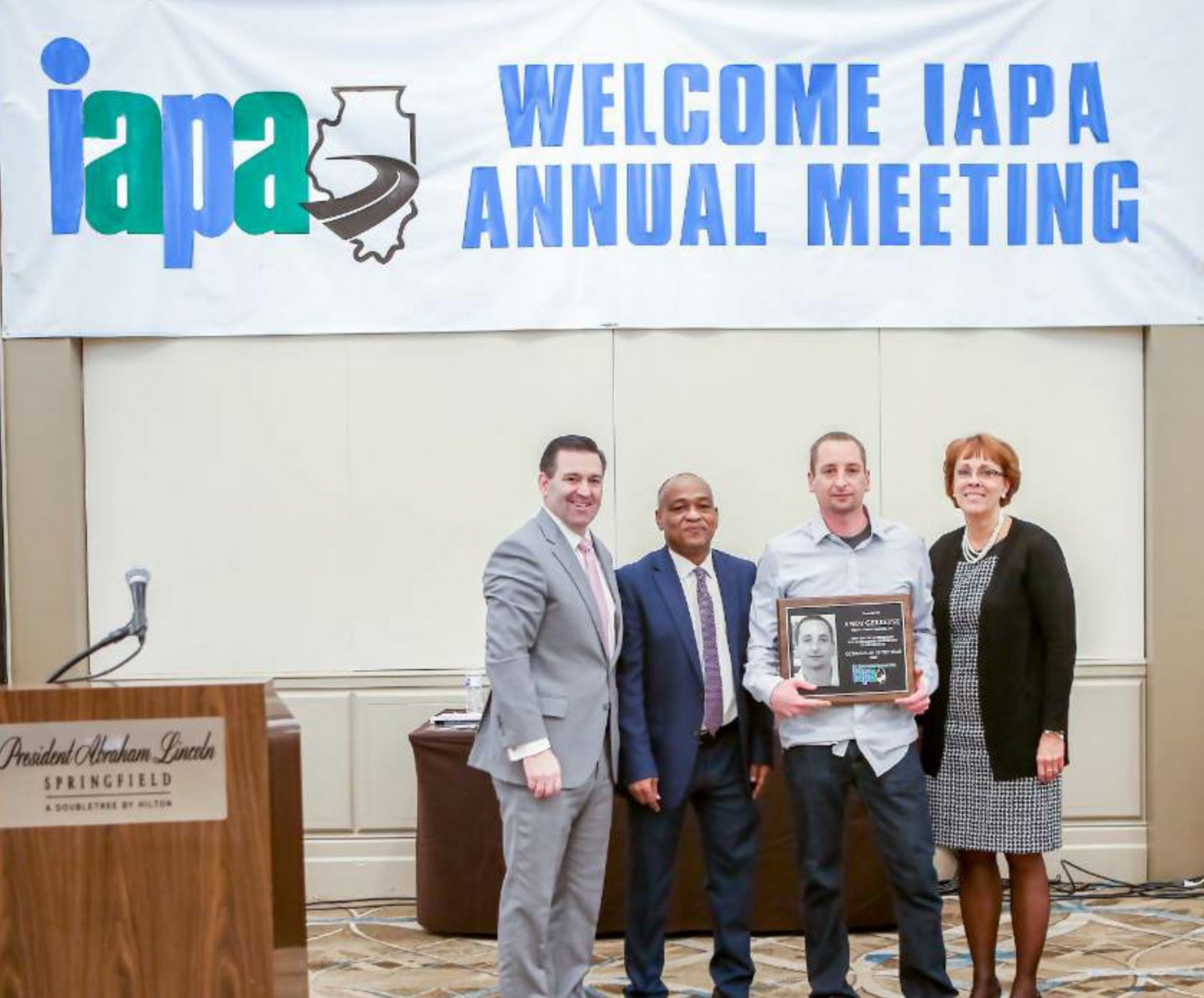
The Illinois Asphalt Pavement Association (IAPA), Springfield, Illinois, was first formed in 1938. Now, the association includes 51 producer and 133 affiliate members, representing roughly 95 percent of the state’s total asphalt tonnage.
Kevin Burke III has been IAPA’s Executive Vice President for five years and has more than 25 years of experience in the asphalt industry. AsphaltPro spent time getting to know Burke and learning how IAPA promotes the asphalt industry in the state of Illinois.

Kevin Burke III has been IAPA’s executive vice president for five years.
What are the top two or three ways you have increased membership in the association?
Illinois has always had a very large number of plant mix members, although it’s declined a bit in recent years due to consolidation. Many of our member companies are family-owned and operated. When someone does sell, they tend to sell to another Illinois member rather than a bigger national contractor.
Since I’ve been here, our membership has increased by 20-30 members, primarily at our affiliate member level. We have different categories for our affiliate members: asphalt suppliers, emulsion suppliers, major suppliers, regular members, associate members and consultants/engineers. Most of our plant mix members are usually contractors doing work for the Illinois Department of Transportation (IL DOT), Illinois Tollway and local governments. We also have smaller paving contractors without plants who do more commercial and private work.
We bring in new members by reaching out to participants/attendees at other events. If a new technology impacts the asphalt industry, we try to get those organizations to join, as well. When our plant mix members work with a potential affiliate members, they’re very good at encouraging them to join IAPA.
In what month do you hold your annual meeting? Do you have a trade show/expo in addition to your annual meeting?
Our annual meeting is held in March. We usually have 500 or 600 people attend–a lot of our members, but also a large contingent of IL DOT and Tollway employees, government officials, local agency officials and legislators.
On our first day, we do a morning meeting for quality control managers that around 100 people attend to get updates on what IL DOT is looking at and what they should be aware of for the upcoming construction season. Then, we have a board luncheon that we also invite the presenters to. We have technical sessions that afternoon and our scholarship reception in the evening. The next morning, we have more general sessions, usually about funding and political topics. Sometimes we’ll have a politician come in to talk about what’s going on at the Capitol. We also have a presidential luncheon to give out our different awards.
Each year, we honor a Person of the Year, Most Active Member, QC Manager of the Year, and contractors that received IL DOT or IL Tollways Asphalt Paving Awards. The Person of the Year is a non-association member, usually from a university or state agency, who has supported IAPA over their career. This year’s recipient is Illinois DOT’s Acting Secretary Omer Osman. Our Member of the Year was Susan Green from Cat Global Paving. She’s helped with a lot of equipment issues, specifically intelligent compaction, and chairs our equipment committee. The QC Manager of the Year was Andy Gerretse from Bigane Paving who is responsible for the multiple HMA testing round robins in IL DOT District 1. The HMA testing round robin allows the contractor to compare its results with the department’s test results, which is critical for contractors to get bonuses versus penalties in IL DOT’s percent within limit acceptance specification.
We started our trade show three years ago and it’s gone over very well. We had 18 to 20 vendors in our first year and this year we maxed out at 32 spaces (our venue has limited space). We always have good participation from our affiliate members.
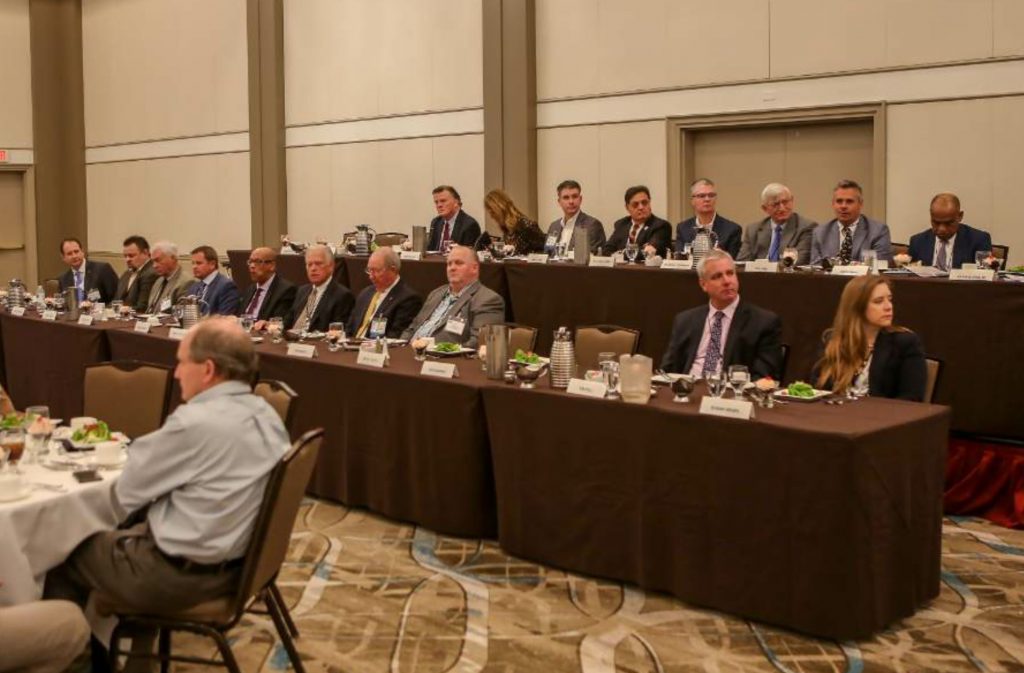
Each year at its annual meeting, IAPA hosts a presidential luncheon to give out a number of awards. Each year, they honor a Person of the Year, Most Active Member, QC Manager of the Year, and contractors that received IL DOT or IL Tollways Asphalt Paving Awards.
What other activities does the state association hold for members as fundraising events, and to what are those funds applied?
Each year members are asked to donate to our scholarship program to award scholarships to students from the University of Illinois-Urbana Champaign, the University of Illinois-Chicago, Southern Illinois University-Edwardsville, Southern Illinois University-Carbondale, Lakeland College and Bradley University.
The scholarship program started back in the ‘80s when our members recognized the need to have good quality people join the asphalt industry. Thanks to our Scholarship Chairperson, Mike Vondra of Reliable Asphalt, we have raised the necessary funds to expand the program in recent years. Last year, we awarded 16 $2,000 scholarships. As part of that scholarship, the students do a research project or report on an asphalt-related topic. It’s our way to get young engineers, technicians and construction managers interested in our industry. We also encourage our members to hire them as interns while they’re in school or as employees when they graduate.
Our most recent initiative that we just announced at our annual meeting in March is to raise funds to endow a professorship at University of Illinois-Urbana Champaign in the name of Marshall R. Thompson. Marshall is a professor emeritus at U of I, but he’s known as the father of pavement design here in Illinois, but also across the country. We just began our efforts to raise $500,000, and within the first couple of weeks, we’d already raised more than $200,000. We should easily reach our goal, because Marshall helped so many people across the country get started in this industry. If we raise $1 million, we will endow a chair position rather than a professorship.
Does IAPA hold educational seminars or webinars for members throughout the year?
Most of our training happens during the November and December and wraps up by March since plants start opening up around April and shut down before Thanksgiving. Most of our training is webinar-based, where we have our affiliate members and other experts present on various topics on a monthly or bimonthly basis.
Our QC managers group meets every other month during the construction season to keep up to speed on what’s going on with IDOT and the Tollway. Right now, Illinois DOT is looking at implementing a balanced mix design approach, including the Hamburg Wheel Tracking Test and the Illinois Flexibility Index Test. That’s going to be a major discussion point as contractors collect and share that data. Since I-FIT is a new test, everyone needs to understand its impact, identify any issues with it, and see what still needs to be resolved.
We also offer specialized training, as needed. We’ve been working with IDOT to work out how to use intelligent compaction as a quality control measure. In May 2019, we offered training related to Veta software needed to evaluate IC data and also offered ProVAL training for IRI smoothness specifications.
All of our technical training and certificate training required by IDOT for QC managers is through Lakeland College.
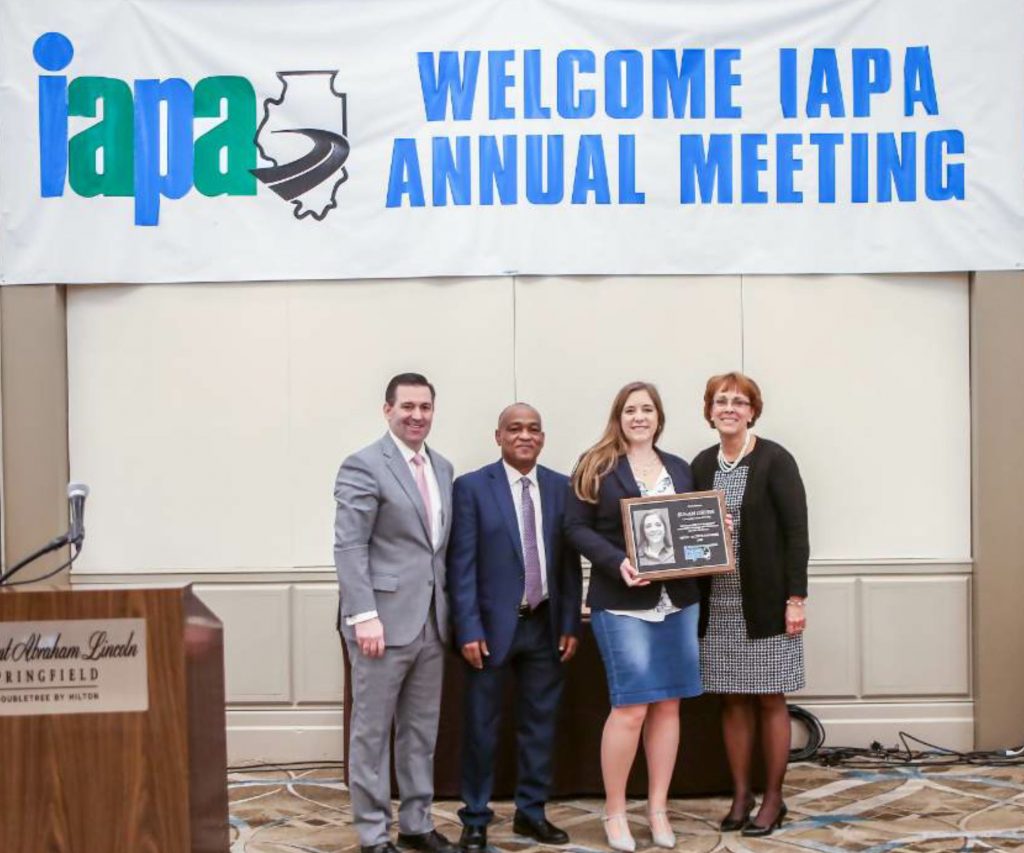
Susan Green of Caterpillar Global Paving receives the IAPA Most Active Member award Pictured, left to right: Kevin Burke (IAPA EVP), Omer Osman (IL DOT Acting Secretary), Susan Green and Anne Bigane Wilson ( IAPA VP).
Who else is on the IAPA team?
We have a small staff, including myself, Office Manager Robin Dobbins, and our accountant, Penny Williams.
About how many member asphalt projects do you visit per year?
20
Member asphalt open house events per year?
10
State agency or DOT meetings?
More than 50.
On a scale of 1 to 5 (1 being none at all; 5 being very much), how much of a threat to your members’ market share/livelihood is the concrete industry in your state?
4. We’ve always had a very competitive industry in Illinois. Historically, in the ‘50s and ‘60s, a lot of new roads were built out of concrete and asphalt was used for overlays and local roads. The concrete industry has always been strong in Illinois and they’ve tried to push the department into using their product, so it’s very important for us to explain why asphalt is a more cost effective and high-performance product. Over time we’ve been able to get more full-depth asphalt pavements built in Illinois, partially because of Marshall Thompson and what he’s done for our industry. Currently, we’re seeing a lot of rubbilization of those older concrete roads to prepare for placing HMA over the rubblized concrete.
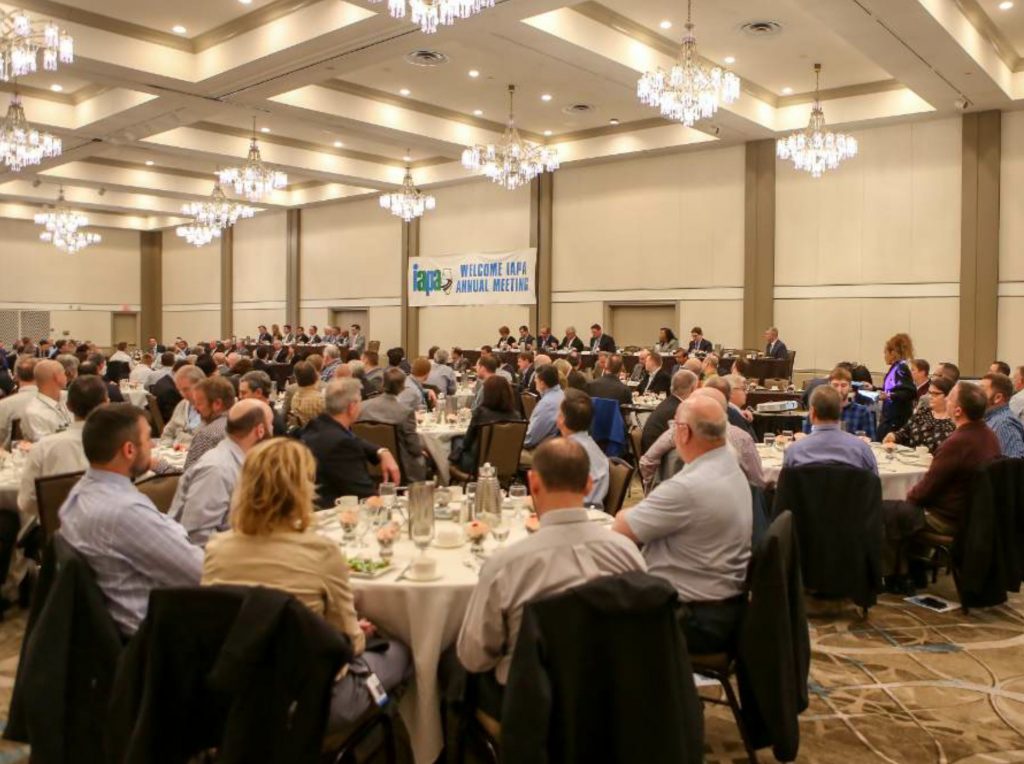
Each year at its annual meeting, IAPA hosts a presidential luncheon to give out a number of awards. Each year, they honor a Person of the Year, Most Active Member, QC Manager of the Year, and contractors that received IL DOT or IL Tollways Asphalt Paving Awards.
On a scale of 1 to 5 (1 being none at all; 5 being very much), how much difficulty are your members having in finding qualified workers for their asphalt paving or production crews?
4. Like everyone else, the workforce in Illinois is seeing a lot of people with many years of experience begin to retire and there hasn’t been as many people entering the construction trades. As I said, most of our members are family-owned and operated, but it isn’t just the owners who are second- and third-generation with that company. A lot of the employees are, too. But, we aren’t seeing as many of the younger generation taking on those roles. That’s why we expanded our scholarship program to encourage people in university settings to enter our industry.
However, workforce development in Illinois isn’t as big a challenge as it is in other states. First, we are a union state. Most of our construction employees on the job are coming from union halls, so that’s not where our workforce development issues are. We face more challenges in full-time employees, like QC managers, estimators and plant managers.
The other reason why workforce development has not severely impacted contractors is IL DOT’s funding for its annual highway program is significantly down from where it needs to be and where it was five or 10 years ago. Our members historically have placed over 15,000,000 tons per year. For the past several years, our members have only paced around 12,000,000 tons per year.
Could you give an example of a way your state APA assists members with workforce development?
Our scholarship program is our biggest effort. This is such a significant challenge that it can’t be done by only one group. The whole industry with the help from our traded unions has to push this initiative. There are plenty of opportunities to get involved even at the high school level to teach kids that trade school is a way to get a good job making $60,000 to $80,000 starting out without accruing a lot of debt. There’s definitely some work to be done to communicate that opportunity.
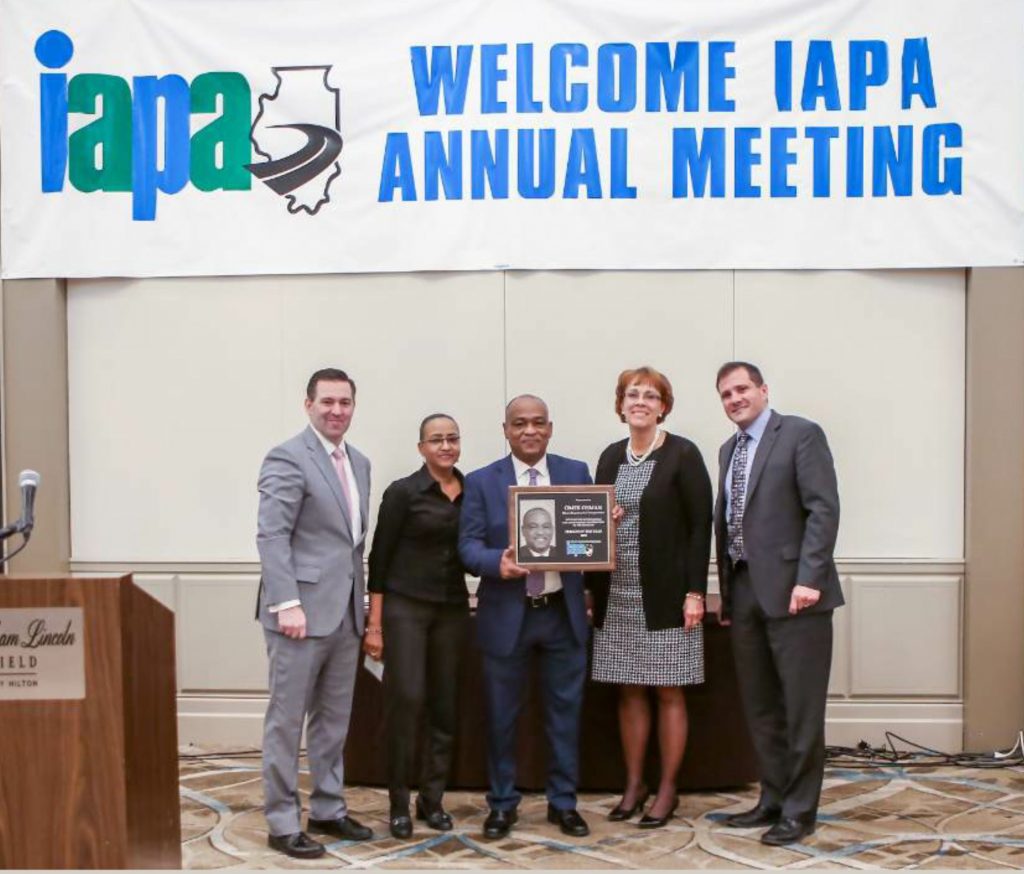
Omer Osman of IL DOT receives the IAPA Person of the Year award. Pictured, left to right: Kevin Burke (IAPA EVP), Magda Nuri Osman, Omer Osman, Anne Bigane Wilson ( IAPA VP) and Paul Loete (IL DOT Director).
On a scale of 1 to 5 (1 being none at all; 5 being very much), how involved are your state elected officials in transportation issues such as funding and infrastructure improvements?
5. Illinois’s infrastructure is vital to our nation’s economy. We have more than 140,000 miles of roads, tens of thousands of bridges, and all Class I railroads come through Illinois. Legislative leaders in Illinois haven’t raised transportation fees since the ‘90s. Instead, they’ve done capital builds every 10 years or so, mostly funded by non-sustainable revenue using bonds. We’re working with legislators and the new governor to put together a more comprehensive package that will be more sustainable, but the legislature has to figure out the best way to provide that sustainable funding for our state’s infrastructure.
Then, on the federal level, we still haven’t seen an increase in revenue for the Highway Trust Fund. The interstates built in the ‘50s and ‘60s have served their useful life. It’s time to figure out how to reconstruct them and how we will fund that reconstruction.
On a scale of 1 to 5 (1 being none at all; 5 being very much), how involved are your asphalt members in transportation issues such as funding and infrastructure improvements?
Our members all have very good relationships with their legislators. Historically, we haven’t organized many plant tours in Illinois, but we did one last year with four or five legislators in Chicago and we plan to do another one in the southern part of the state.
The Association as a whole is part of the Transportation for Illinois Coalition, which also includes the Illinois Road and Transportation Builders Association and the Association of General Contractors – Illinois, trade unions, the Illinois Chamber of Commerce, and trucking groups, among others. TFIC has been around for 10 to 15 years to advocate for sustainable infrastructure funding in Illinois. Our members participate in TFIC’s Lobby Days and other initiatives to reach out to legislators.
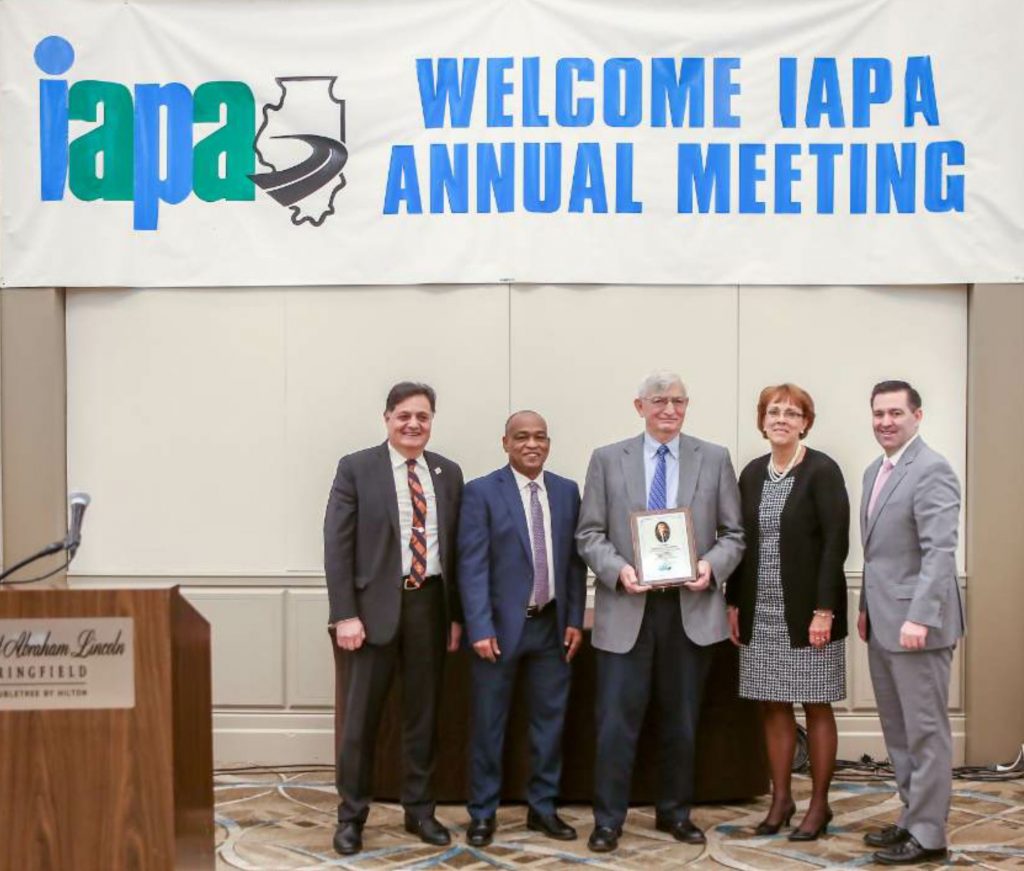
IAPA announces its Marshall R. Thompson Endowment efforts. Pictured, left to right: Imad Al-Qadi (UIUC Bliss Professor of Engineering), Omer Osman (IL DOT Acting Secretary), Marshall Thompson, Anne Bigane Wilson (IAPA VP) and Kevin Burke (IAPA EVP).
Get to Know Kevin Burke III
Why did you join the asphalt industry?
I have a B.S. in Chemistry from Washington University in St. Louis. Immediately after college, I started working for IL DOT in their chemistry lab, first with traffic paints and other miscellaneous highway materials. In 1996, I moved into IL DOT’s bituminous chemistry lab, where I was responsible for setting up the first PG binder lab at Illinois DOT. I left materials in 2000 for IL DOT’s local roads and streets division.
What do you see as the most important part of your job as an executive vice president of a SAPA?
The most important thing is communicating with our members. Part of it is supporting their company in resolving issues, but also to communicate new technologies, benefits and innovations that contractors should be looking at to make them more efficient and improve operations.
What is the most challenging part of your job?
We can advocate for funding, and we do, but obviously our SAPA doesn’t have control over the DOT budget. However, that’s still the biggest challenge we’re facing right now, due to the limited amount of work available. Contractors have equipment and plants idle. We are nowhere near capacity in Illinois, in terms of total tonnage.
Another challenge is balancing the needs of our contractors and those of the DOT.
What do you find most enjoyable about your job as an executive vice president of a SAPA?
To me, it’s our members. We’re very unique because so many of our plant mix members are family-owned and operated. Those people are so committed, to their company, to their family, to our state, and to IAPA. They’re so enjoyable to work with, and they really are trying to provide the best product at the best price for the taxpayers.
What has been the most rewarding experience for you during your time as the executive vice president?
When I was at the DOT, I knew the local agencies very well, but I didn’t know the contractors all that well. Going to the other side to be the executive vice president of IAPA, I’ve enjoyed getting their perspective and understanding that side of the industry better. I also really enjoy working with the other state execs. Everyone is so hard-working and if you need something, they are there to support you. And, most likely they’ve gone through what you’re going through.
